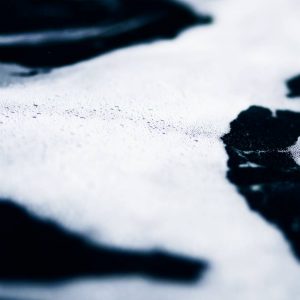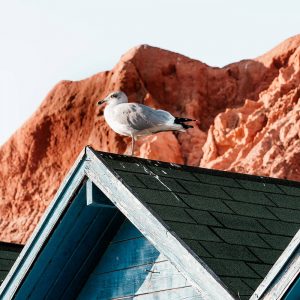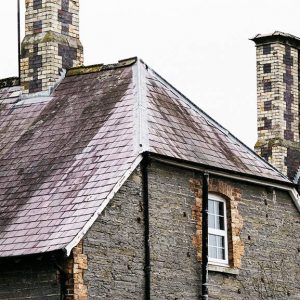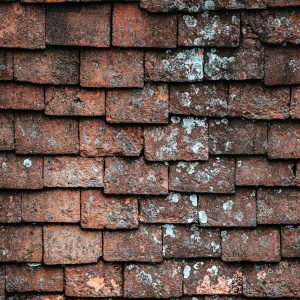Roof shampoo has become a great way to prolong your roof’s life and make a building look brand new. It’s no wonder that roof cleaning is becoming a popular choice for homeowners and businesses to care for their properties. But do you know the difference between shampoo and bleach?

With roof cleaning on the rise, there are a few roof cleaning methods that claim good results. However, there are also counterclaims and conflicting information regarding these techniques. Which technique of roof cleaning is right for you?
In this article, we help you understand the two main types of cleaning methods most available to consumers. Top Notch Roof Cleaning Cleaning Method, and Bleach Roof Cleaning Method.
Top Notch Roof Cleaning Cleaning Method
The Top Notch Roof Cleaning cleaning method is the cleaning method of choice. It is NON-bleach, green, ECO-FRIENDLY, and uses low-pressure to clean any roof type. Top Notch Roof Cleaning® roof cleaning method uses an exclusive soap formulated to be safe on all asphalt and fiberglass shingles. It will not harm any landscaping around the home yet is 100% effective at removing roof stains from algae and moss. No damaging high pressure, scrubbing, or brushing is necessary for great results. The results are immediate and complete. You will only need one application for long-lasting results.
Authorized Top Notch Roof Cleaning® contractors
Authorized roof shampoo contractors are incredible because they use eco-friendly stain removal products and equipment to ensure ALL stains from algae are removed from your roof. Any spray-on leave-on products are not as efficient to remove roof stains. With the Top Notch Roof Cleaning® roof cleaning system, there is no waiting, no wondering, and no worrying if the stains will go away.
You will see for yourself that algae and moss stains are completely gone before your Top Notch Roof Cleaning® contractor leaves your home or business.
Cost
The Top Notch Roof Cleaning Cleaning method tends to cost a little more than other forms of roof cleaning. This cost difference is because Top Notch Roof Cleaning Contractors go through special training and care to provide the best solution possible for your home or business. These technicians take time with you and explain the entire process of cleaning to you. They inspect your roof and provide exceptional service before, during, and after your roof cleaning. They are professionals who make sure they tend every square inch of your roof with top quality, eco-safe products without damaging your shingles or your landscaping.

Fun fact – Some shingle manufacturers have provided warranty roof cleanings for their customers using the Top Notch Roof Cleaning Method.
Bleach Roof Cleaning Method (or Soft Wash)
Many people consider the bleach roof cleaning method because it can be a low-cost way to clean a roof. However, some drawbacks must be considered before applying bleach anywhere on a property.
Bleach is not eco-friendly and is generally not safe for asphalt, fiberglass shingles, or the environment. It will harm landscaping around the home and will kill any plant that it touches. The results are seemingly immediate on a roof, however not long-lasting. Bleach roof cleaning is also required to be repeated in many applications.

Health
The Bleach Cleaning Method can also be dangerous to consumers’ health. This includes not only the owners of the property but neighbors and households nearby. The Centers for Disease Control and Prevention state, “Chlorine gas can be recognized by its pungent, irritating odor, which is like the odor of bleach. The pungent smell may provide adequate warning to people that they are exposed. When chlorine gas comes into contact with moist tissues such as the eyes, throat, and lungs, an acid is produced that can damage these tissues.”
CDC
To learn more about the Center for Disease Control and chlorine effects: https://www.cdc.gov/niosh/ershdb/emergencyresponsecard_29750024.html
Consumer Reports
Consumer reports warn consumers not to use chlorine-bleach solution described by the Asphalt Roofing Manufacturers Association due to its damaging effects. See an article here: https://www.consumerreports.org/cro/news/2009/11/tip-of-the-day-get-rid-of-roof-algae-which-can-damage-shingles/index.htm
Be Careful
Bleach is a chemical that should be regarded precautiously, as we’ve learned in this article. However, it is not the only chemical used in roof cleaning formulas. Many roof cleaning contractors who use chlorine bleach will design cleaning formulas themselves. These formulas consist of various chemicals such as phosphates (banned in multiple states), dish detergents, laundry detergents, various surfactants, and odor masking scents. Bleach and the above chemicals will corrode roofing materials and metal (even in weak concentrations). High strength chlorine bleach will accelerate the damage – especially when the roof has not been adequately rinsed.

Many contractors who use bleach will tell you that they follow ARMA guidelines. Asphalt Roofing Manufacturers Association (ARMA) recommends using bleach to remove living algae from roofs. However, their recommendation is given with precautions. “Take proper precautions to protect landscaping and surrounding areas from the chlorine bleach solution. Use appropriate personal protective equipment when working with chlorine bleach. Algae will disappear and wash away with subsequent rains. In severe cases, it may take more than one bleach treatment to kill all of the moss. Never use a pressure washer to clean an asphalt shingle roof as this will cause granule loss and very likely premature failure of the roof system.”

Please be careful
If you are interested in using a bleach product, please use proper precautions for plants and landscaping and ensure that the contractor does not pressure-wash the roof. It is also recommended to warn neighbors of the potential odor with bleach roof cleaning. Finally, before a bleach cleaning, check with your local county office to see if permits are required due to widespread odor.
Takeaway
Bleach cleaning is quite common, but contractors do not typically discuss the methods or effects. Be sure to discuss all washing techniques with a contractor to learn about the chemicals they use in the process.
